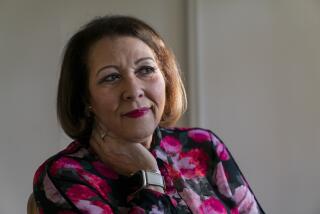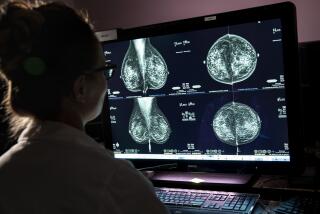Debating Breast Exams
- Share via
Do mammograms save lives? Studies conducted in the 1970s and ‘80s concluded that they do, and that regular screening can cut breast cancer deaths by at least 30%. Women have long accepted this idea as gospel--namely that if they dutifully get mammograms, their cancer will be caught early enough to be treated.
Scientists are now challenging this conventional wisdom. First, Danish researchers determined that the original studies were so flawed that there was no evidence that mammograms reduced the death toll.
For the record:
12:00 a.m. March 7, 2002 FOR THE RECORD
Los Angeles Times Thursday March 7, 2002 Home Edition Main News Part A Page 2 A2 Desk 1 inches; 31 words Type of Material: Correction
Mammogram debate--In a March 4 question-and-answer interview in the Health section, Dr. Alfred Berg was incorrectly identified as vice chairman of the U.S. Preventive Services Task Force. He is actually the chairman.
For The Record
Los Angeles Times Monday March 11, 2002 Home Edition Health Part S Page 3 View Desk 1 inches; 28 words Type of Material: Correction
Mammogram debate-In a March 4 Q&A; interview about mammography, Dr. Alfred Berg was incorrectly identified as vice chairman of the U.S. Preventive Services Task Force. He is actually the chairman.
Then in January, word leaked out that the Physicians Data Query panel, cancer experts who advise the National Cancer Institute, were coming to essentially the same conclusion. (The panel is scheduled to release its formal report this spring.)
Last month, a task force convened by the U.S. Department of Health and Human Services weighed in with its findings, reaffirming the value of mammograms in screening for breast cancer, and even went a step further by urging women to start regular testing sooner--at age 40. The government previously had recommended mammography screening beginning at age 50.
The HHS and the NCI currently recommend screening every one to two years. Women with a higher-than-average risk of breast cancer should consult with medical experts as to whether they should begin screenings before age 40, and how often they should be tested.
Amid all this controversy, women are understandably confused about whether to have a mammogram. We asked two experts in this debate to help clarify some of the issues in order to help women make an informed decision.
Dr. Alfred O. Berg, vice chairman of the U.S. Preventive Services Task Force on mammography, argues that women should have mammograms, saying they can reduce breast cancer deaths.
Donald A. Berry, a member of the Physicians Data Query panel of cancer experts, says regular screenings aren’t necessary for most women and that the evidence supporting routine mammograms is weak.
*
For questions, and the experts’ answers, about mammograms, see S4.






